Abstract
Two experiments were designed to assess whether depriving rats of food would increase the reinforcement effectiveness of wheel running (Experiment 1) and whether satiation for wheel running would decrease the reinforcement effectiveness of food (Experiment 2). In Experiment 1, a progressive-ratio schedule was used to measure the reinforcement effectiveness of wheel running when rats were deprived or not deprived of food. Completion of a fixed number of lever presses released a brake on a running wheel for 60 s, and the response requirement was systematically increased until the rat stopped pressing or until 8 hr had elapsed. The ratio value reached (and the total number of lever presses) was an inverted-U function of food deprivation (percentage body weight). In Experiment 2, when wheel running preceded test sessions, fewer food-reinforced lever presses were maintained by the progressive-ratio schedule, and responding occurred at a lower rate on a variable-interval schedule. An interpretation of these results is that deprivation or satiation with respect to one event (such as food) alters the reinforcement effectiveness of a different event (such as access to wheel running).
Keywords: wheel running, eating, establishing operations, reinforcement effectiveness, lever press, rats
Full text
PDF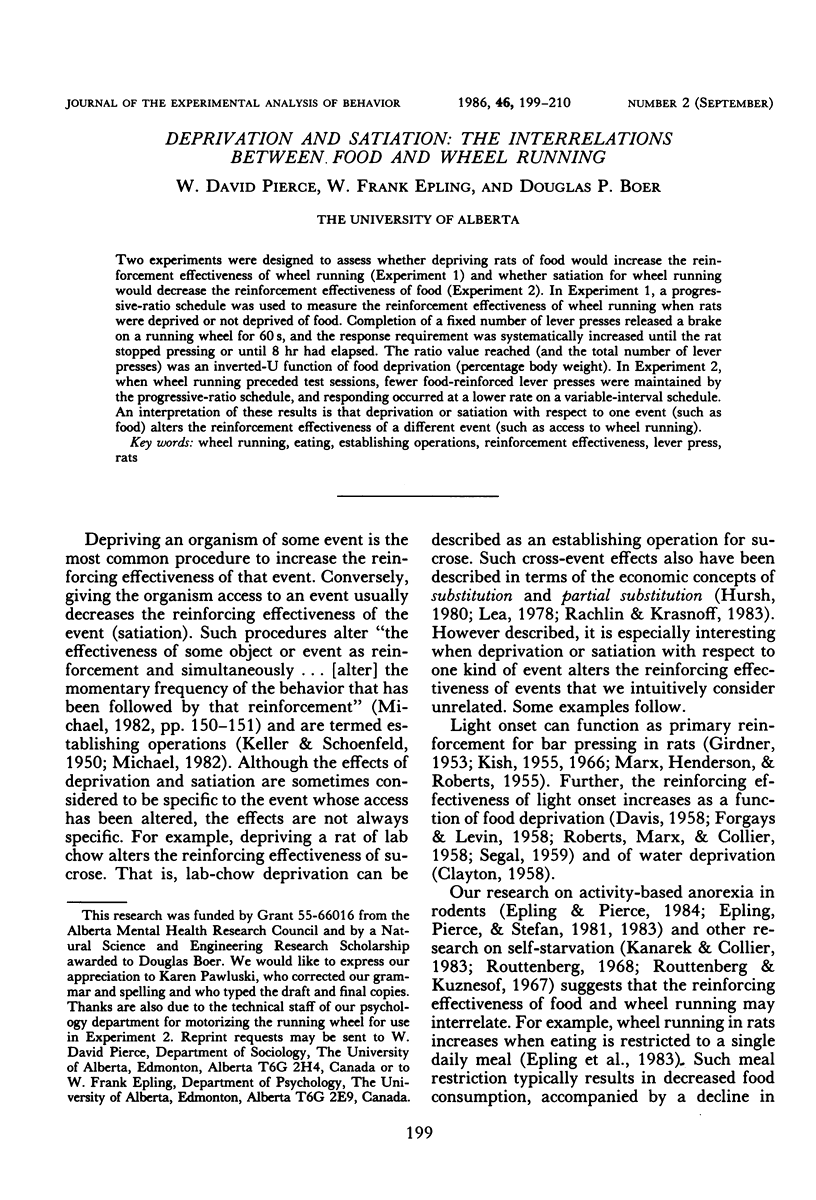
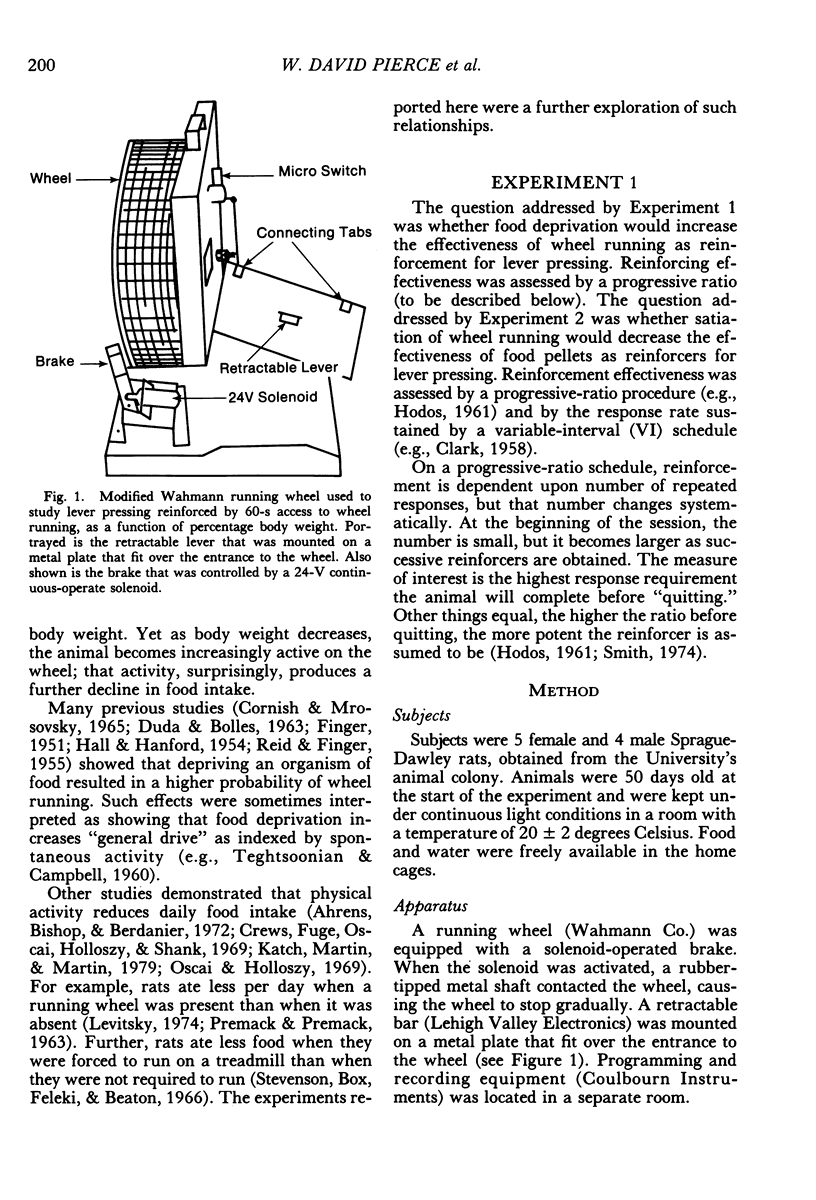
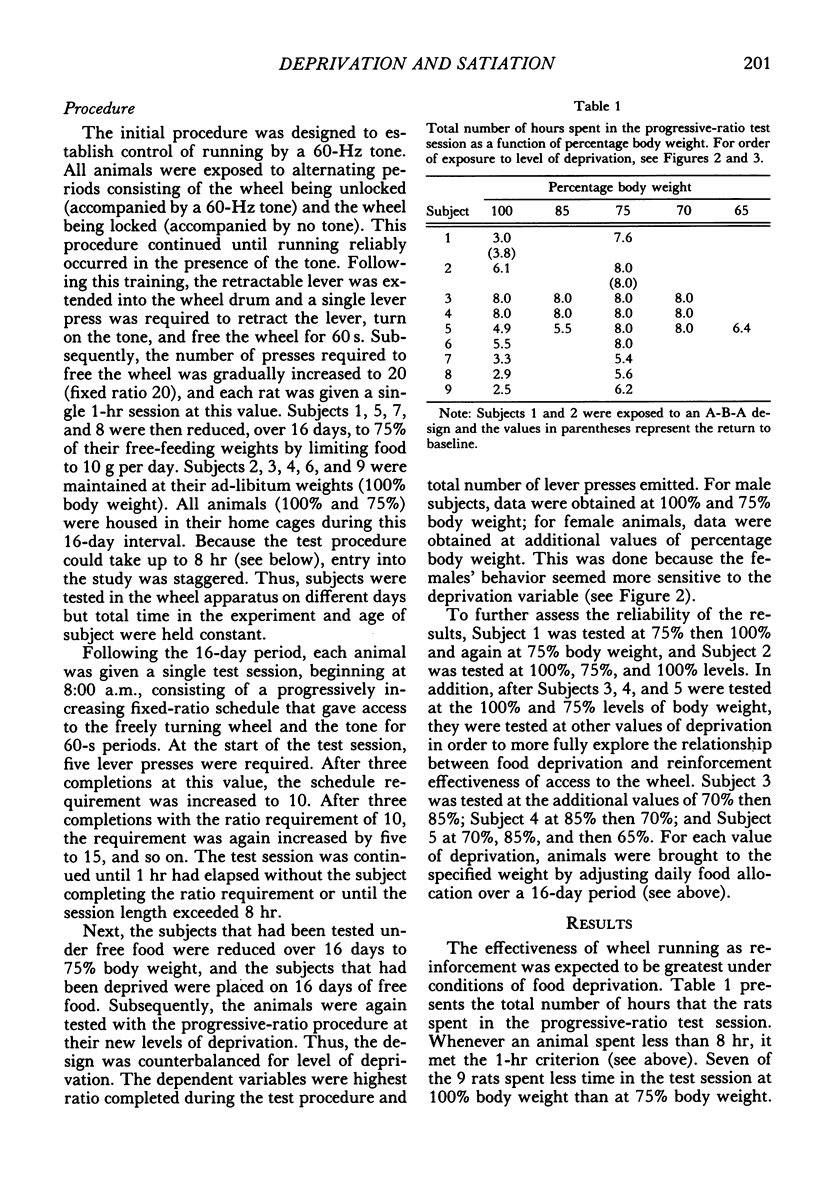
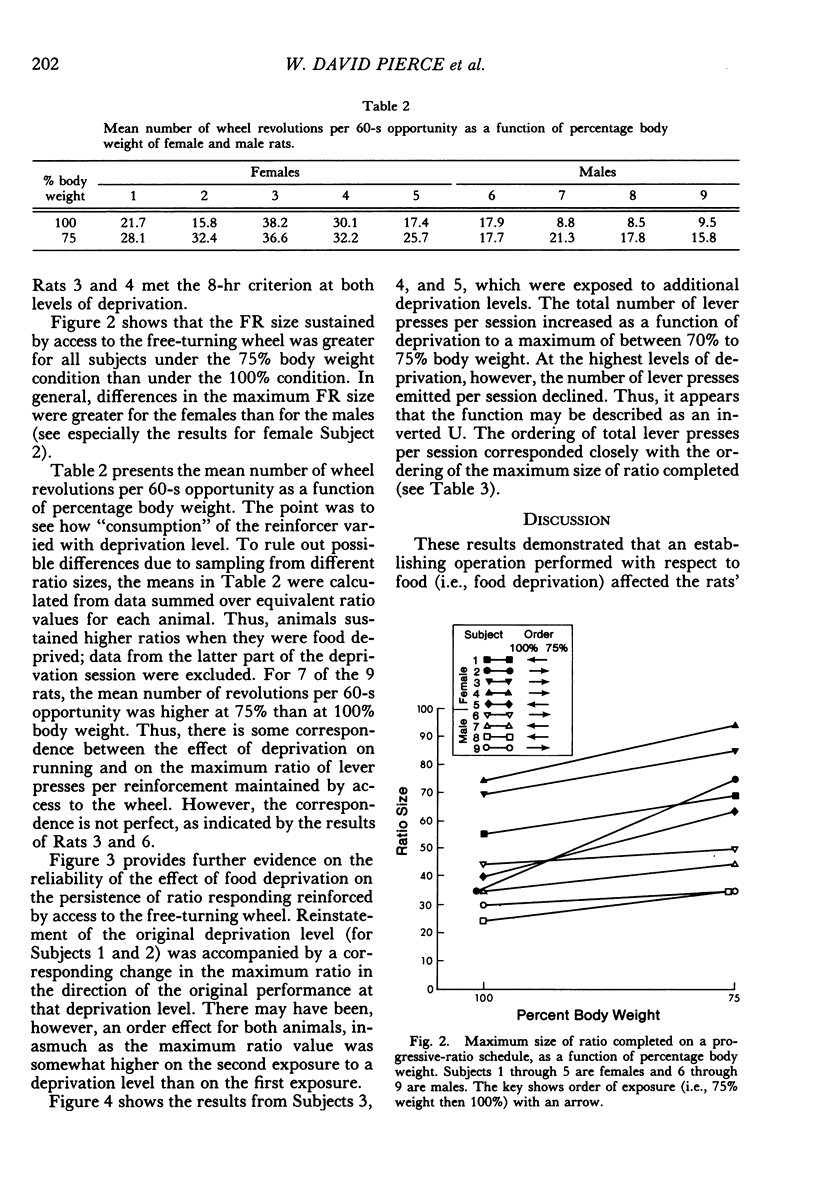
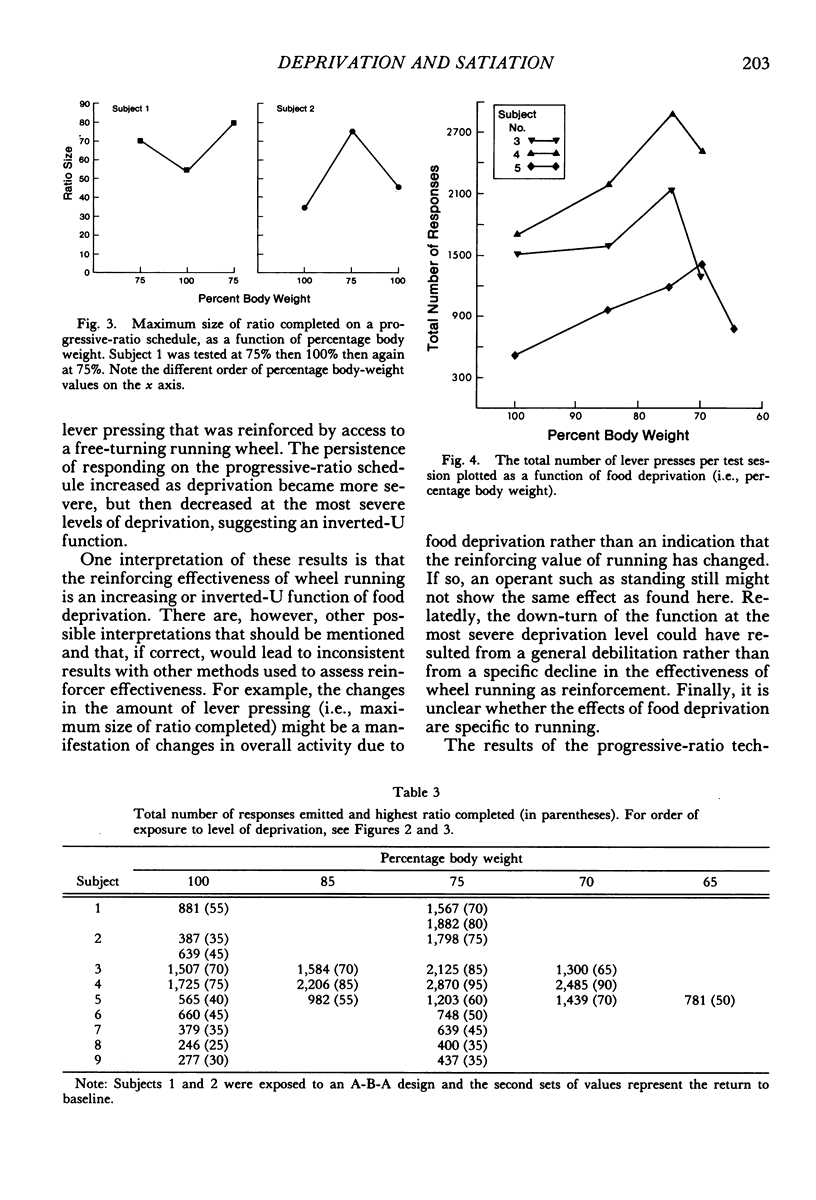
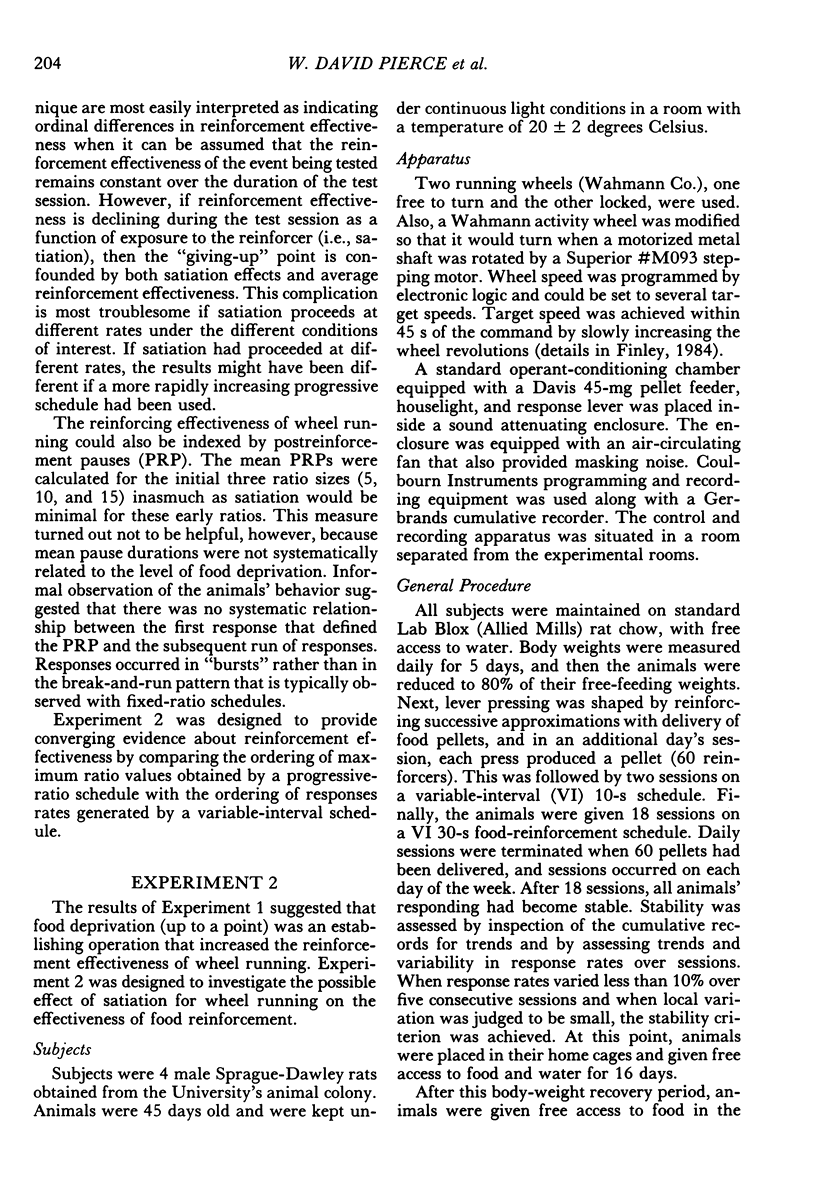
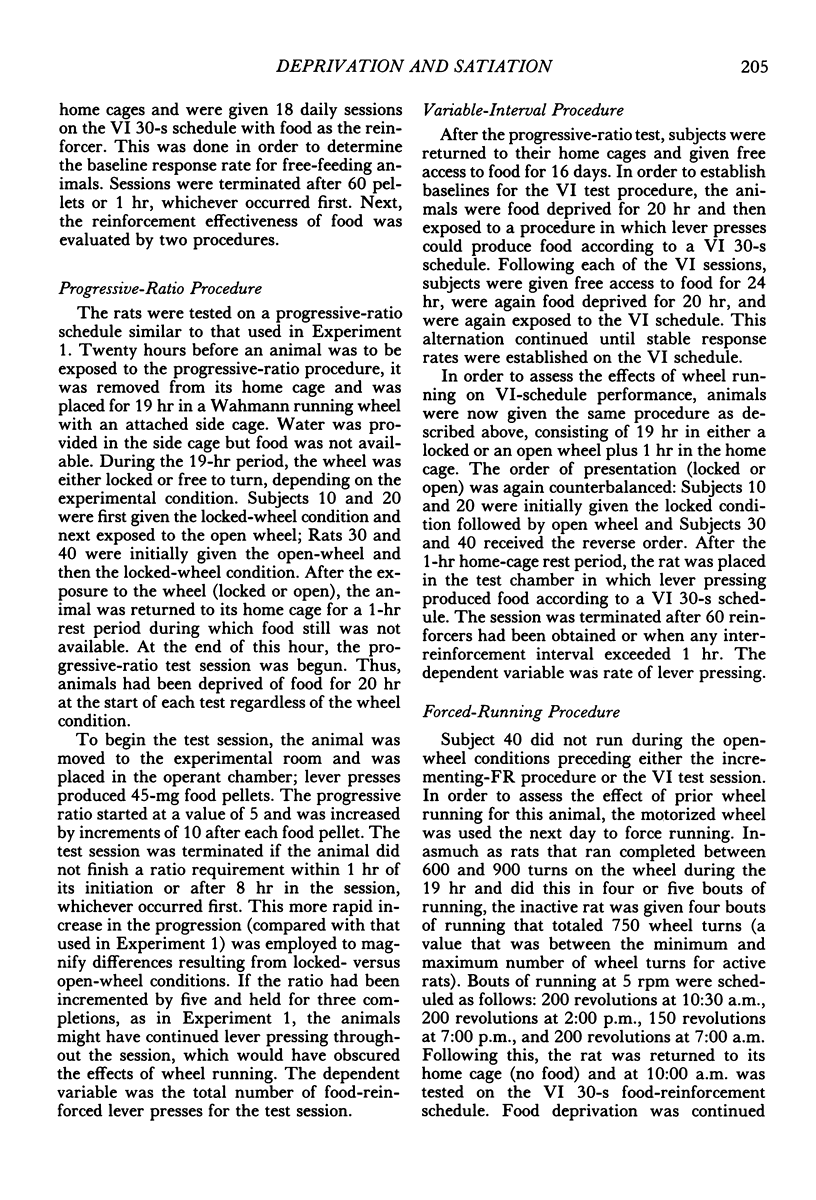
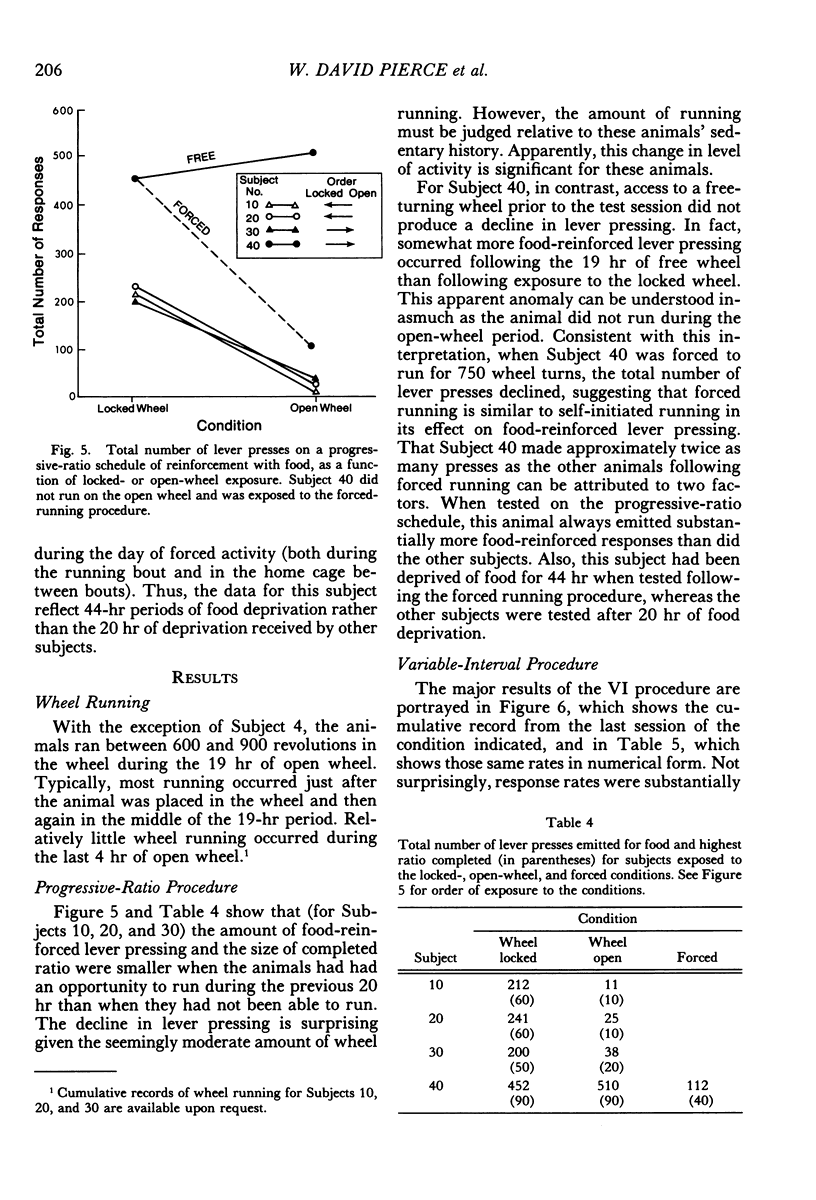
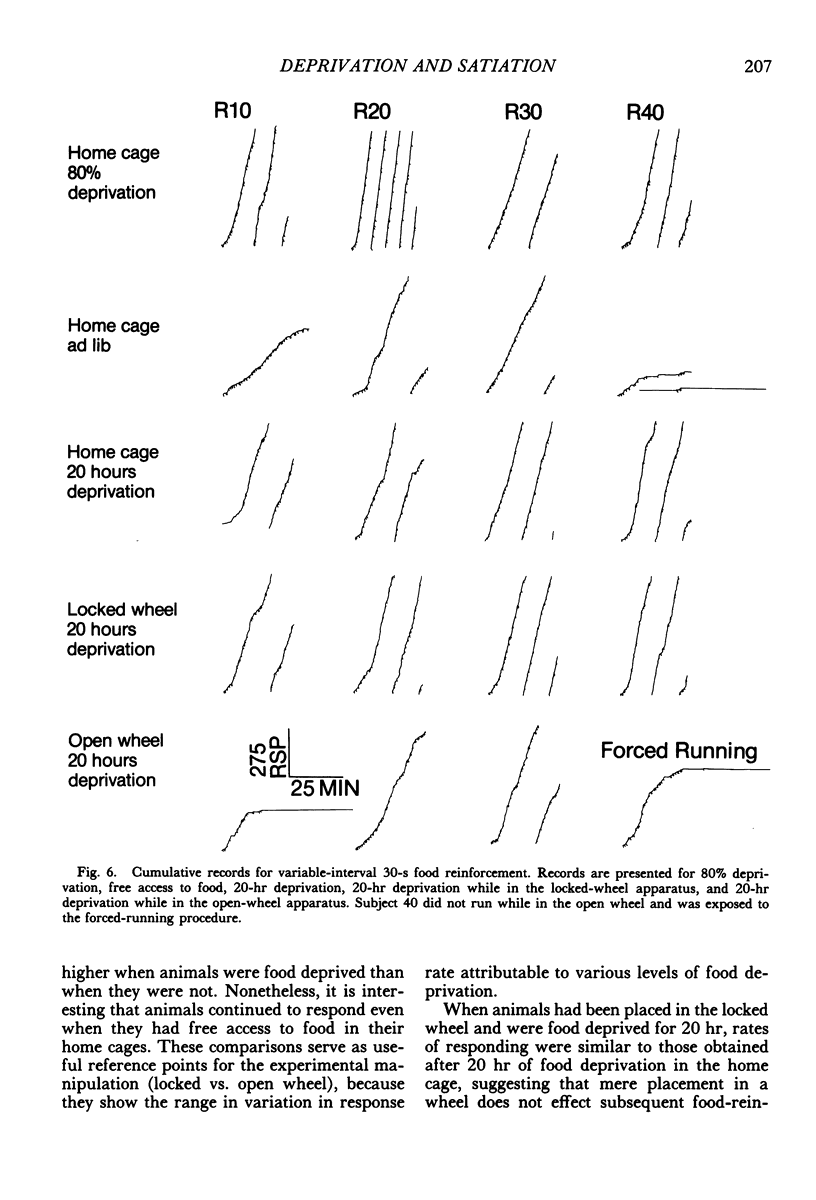
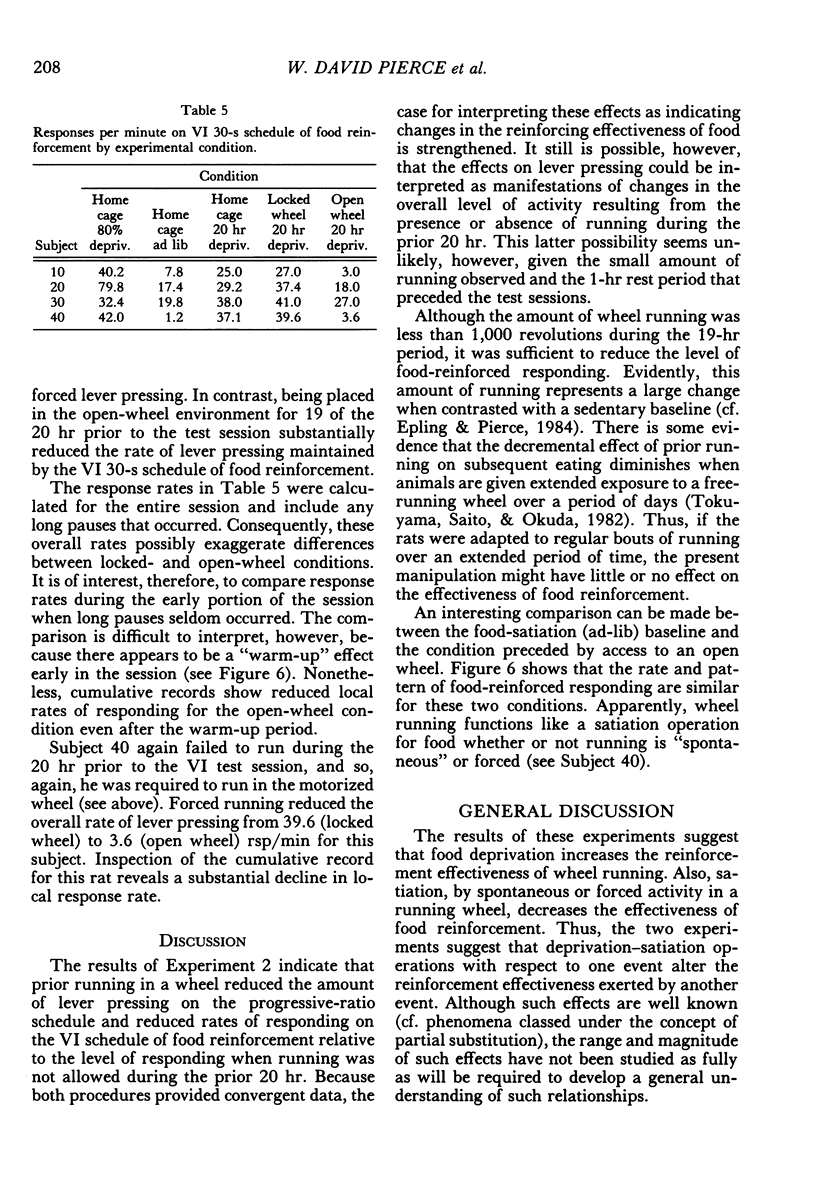
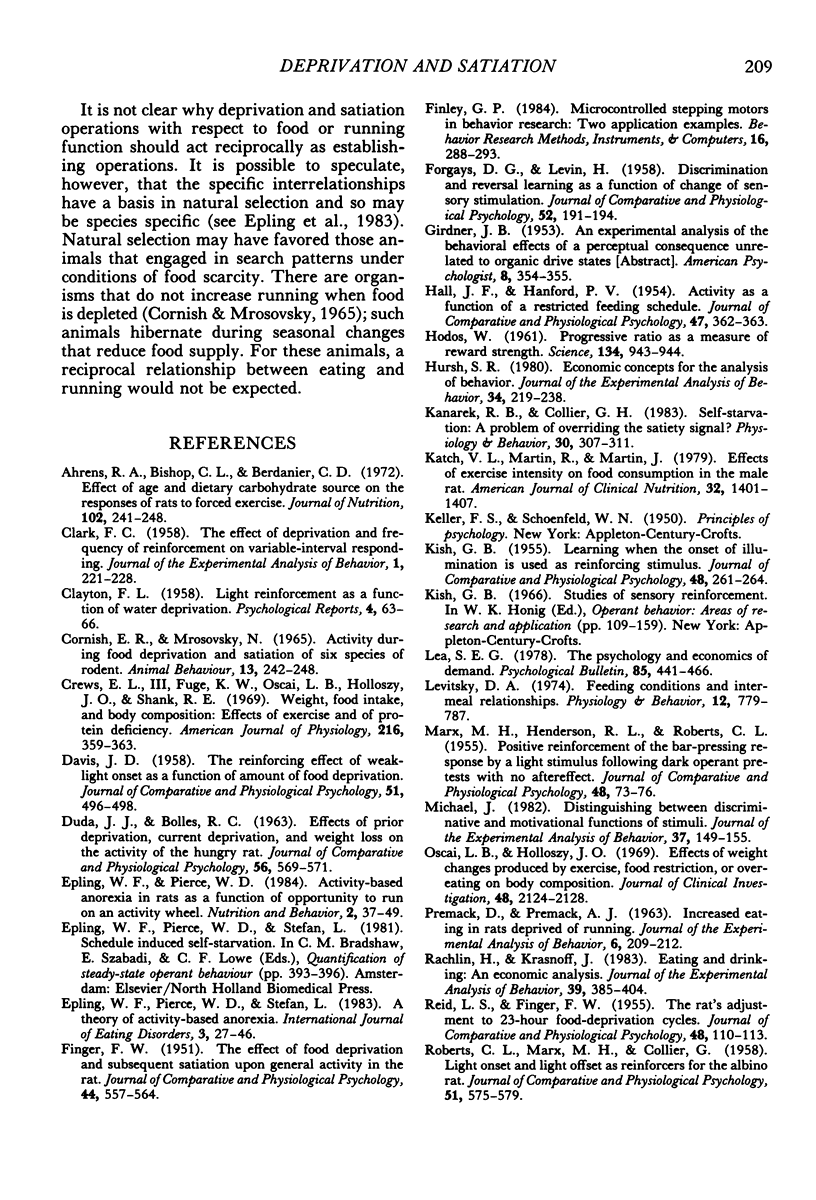
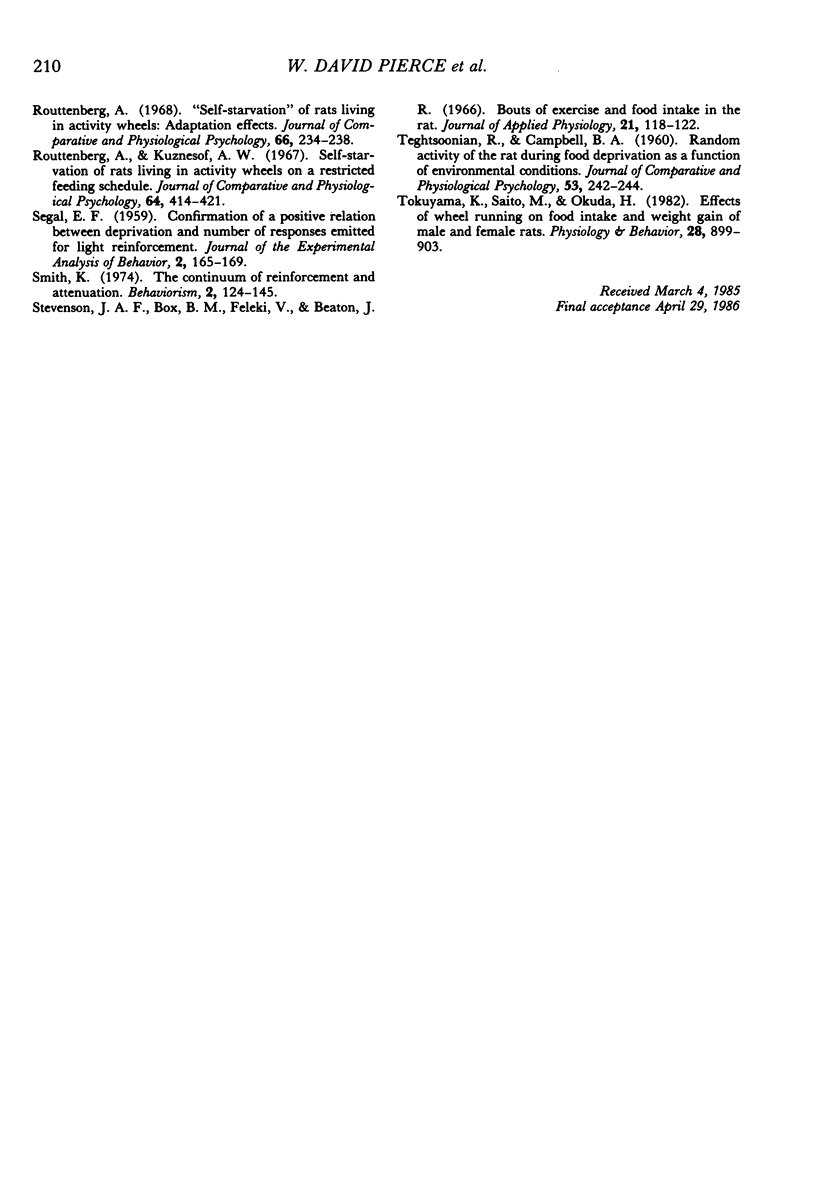
Selected References
These references are in PubMed. This may not be the complete list of references from this article.
- Ahrens R. A., Bishop C. L., Berdanier C. D. Effect of age and dietary carbohydrate source on the responses of rats to forced exercise. J Nutr. 1972 Feb;102(2):241–247. doi: 10.1093/jn/102.2.241. [DOI] [PubMed] [Google Scholar]
- Clark F. C. The effect of deprivation and frequency of reinforcement on variable-interval responding. J Exp Anal Behav. 1958 Aug;1(3):221–228. doi: 10.1901/jeab.1958.1-221. [DOI] [PMC free article] [PubMed] [Google Scholar]
- Cornish E. R., Mrosovsky N. Activity during food deprivation and satiation of six species of rodent. Anim Behav. 1965 Apr-Jul;13(2):242–248. doi: 10.1016/0003-3472(65)90042-4. [DOI] [PubMed] [Google Scholar]
- Crews E. L., 3rd, Fuge K. W., Oscai L. B., Holloszy J. O., Shank R. E. Weight, food intake, and body composition: effects of exercise and of protein deficiency. Am J Physiol. 1969 Feb;216(2):359–363. doi: 10.1152/ajplegacy.1969.216.2.359. [DOI] [PubMed] [Google Scholar]
- DAVIS J. D. The reinforcing effect of weak-light onset as a function of amount of food deprivation. J Comp Physiol Psychol. 1958 Aug;51(4):496–498. doi: 10.1037/h0049158. [DOI] [PubMed] [Google Scholar]
- FINGER F. W. The effect of food deprivation and subsequent satiation upon general activity in the rat. J Comp Physiol Psychol. 1951 Dec;44(6):557–564. doi: 10.1037/h0055692. [DOI] [PubMed] [Google Scholar]
- FORGAYS D. G., LEVIN H. Discrimination and reversal learning as a function of change of sensory stimulation. J Comp Physiol Psychol. 1959 Apr;52(2):191–194. doi: 10.1037/h0039831. [DOI] [PubMed] [Google Scholar]
- HALL J. F., HANFORD P. V. Activity as a function of a restricted feeding schedule. J Comp Physiol Psychol. 1954 Oct;47(5):362–363. doi: 10.1037/h0060276. [DOI] [PubMed] [Google Scholar]
- HODOS W. Progressive ratio as a measure of reward strength. Science. 1961 Sep 29;134(3483):943–944. doi: 10.1126/science.134.3483.943. [DOI] [PubMed] [Google Scholar]
- Hursh S. R. Economic concepts for the analysis of behavior. J Exp Anal Behav. 1980 Sep;34(2):219–238. doi: 10.1901/jeab.1980.34-219. [DOI] [PMC free article] [PubMed] [Google Scholar]
- KISH G. B. Learning when the onset of illumination is used as reinforcing stimulus. J Comp Physiol Psychol. 1955 Aug;48(4):261–264. doi: 10.1037/h0040782. [DOI] [PubMed] [Google Scholar]
- Kanarek R. B., Collier G. H. Self-starvation: a problem of overriding the satiety signal? Physiol Behav. 1983 Feb;30(2):307–311. doi: 10.1016/0031-9384(83)90024-0. [DOI] [PubMed] [Google Scholar]
- Katch V. L., Martin R., Martin J. Effects of exercise intensity on food consumption in the male rat. Am J Clin Nutr. 1979 Jul;32(7):1401–1407. doi: 10.1093/ajcn/32.7.1401. [DOI] [PubMed] [Google Scholar]
- Levitsky D. A. Feeding conditions and intermeal relationships. Physiol Behav. 1974 May;12(5):779–787. doi: 10.1016/0031-9384(74)90014-6. [DOI] [PubMed] [Google Scholar]
- MARX M. H., HENDERSON R. L., ROBERTS C. L. Positive reinforcement of the bar-pressing response by a light stimulus following dark operant pretests with no after effect. J Comp Physiol Psychol. 1955 Apr;48(2):73–76. doi: 10.1037/h0045062. [DOI] [PubMed] [Google Scholar]
- Michael J. Distinguishing between discriminative and motivational functions of stimuli. J Exp Anal Behav. 1982 Jan;37(1):149–155. doi: 10.1901/jeab.1982.37-149. [DOI] [PMC free article] [PubMed] [Google Scholar]
- Oscai L. B., Holloszy J. O. Effects of weight changes produced by exercise, food restriction, or overeating on body composition. J Clin Invest. 1969 Nov;48(11):2124–2128. doi: 10.1172/JCI106179. [DOI] [PMC free article] [PubMed] [Google Scholar]
- PREMACK D., PREMACK A. J. Increased eating in rats deprived of running. J Exp Anal Behav. 1963 Apr;6:209–212. doi: 10.1901/jeab.1963.6-209. [DOI] [PMC free article] [PubMed] [Google Scholar]
- REID L. S., FINGER F. W. The rat's adjustment to 23-hour food-deprivation cycles. J Comp Physiol Psychol. 1955 Apr;48(2):110–113. doi: 10.1037/h0042051. [DOI] [PubMed] [Google Scholar]
- ROBERTS C. L., MARX M. H., COLLIER G. Light onset and light offset as reinforcers for the albino rat. J Comp Physiol Psychol. 1958 Oct;51(5):575–579. doi: 10.1037/h0042974. [DOI] [PubMed] [Google Scholar]
- Rachlin H., Krasnoff J. Eating and drinking: An economic analysis. J Exp Anal Behav. 1983 May;39(3):385–404. doi: 10.1901/jeab.1983.39-385. [DOI] [PMC free article] [PubMed] [Google Scholar]
- Routtenberg A. "Self-starvation" of rats living in activity wheels: adaptation effects. J Comp Physiol Psychol. 1968 Aug;66(1):234–238. doi: 10.1037/h0025977. [DOI] [PubMed] [Google Scholar]
- Routtenberg A., Kuznesof A. W. Self-starvation of rats living in activity wheels on a restricted feeding schedule. J Comp Physiol Psychol. 1967 Dec;64(3):414–421. doi: 10.1037/h0025205. [DOI] [PubMed] [Google Scholar]
- SEGAL E. F. Confirmation of a positive relation between deprivation and number of responses emitted for light reinforcement. J Exp Anal Behav. 1959 Apr;2:165–169. doi: 10.1901/jeab.1959.2-165. [DOI] [PMC free article] [PubMed] [Google Scholar]
- Stevenson J. A., Box B. M., Feleki V., Beaton J. R. Bouts of exercise and food intake in the rat. J Appl Physiol. 1966 Jan;21(1):118–122. doi: 10.1152/jappl.1966.21.1.118. [DOI] [PubMed] [Google Scholar]
- TEGHTSOONIAN R., CAMPBELL B. A. Random activity of the rat during food deprivation as a function of environmental conditions. J Comp Physiol Psychol. 1960 Jun;53:242–244. doi: 10.1037/h0042404. [DOI] [PubMed] [Google Scholar]
- Tokuyama K., Saito M., Okuda H. Effects of wheel running on food intake and weight gain of male and female rats. Physiol Behav. 1982 May;28(5):899–903. doi: 10.1016/0031-9384(82)90211-6. [DOI] [PubMed] [Google Scholar]



